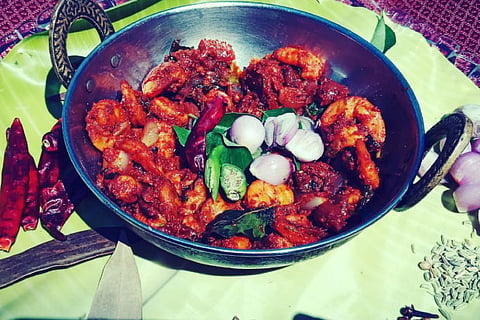

Chennai
Mohan, the owner of Navayuga Computers, Vijay and Lokchander, the general manager of St James Court Beach Resort in Puducherry, were with me. Nearly 20 years ago, along with my designer friend Meenakshi, we had done up the cottages here as the property had just been taken over. I had also helped in setting up their kitchen and the menu.
Coming to think of it, 20 years seem to have passed like the snap of a finger. So many events and people would have happened in one’s life, but what remains are the memories of good times and great food. Food, like mother’s cooking, goes straight from one’s soul to another, especially when the recipes are centuries old.
A walk around the lawns refreshed all of us and we sat down with glasses of cold watermelon juice. That was when a thought struck me. I began to wonder if we could get some fresh fish or prawns from the fishermen, who were hauling in their nets, a little away from the private side of the beach. Two young boys sat down sorting out the catch while laughing amongst themselves. Further down, there was a mud track which led to the beach and I decided to venture forth. I also spotted a few women busy with their baskets, filling them with the load which the boat had brought in. I walked up to the person whose catch had a lot of prawns, next to where the boys were seated. They looked at me with interest, anticipating a potential buyer. I did not disappoint them, but before buying, I was keen to know why the boys were working when they should have been in school.
From nearby, “Bonjouru!” chirped a dusky-skinned woman in a Tamil accent, draped in a technicolour saree, as she walked towards me with a basket perched on her waist with the scent spreading of fish and the fragrance of jasmine, courtesy a garland threaded through her hair. I noticed crabs and fish peeking out of her brown basket, now cradled in her arms. She wanted me to buy her fare, but was soon chased away by Shiva, one of the boys. Chandru, his brother, replied saying there was no one to help their father as their mother had passed away and they had a baby sister to look after. His father walked up to explain how fishing has been their family livelihood since their great great grandfathers’ time nearly two centuries ago. Later, Lokchander elaborated on the trade factor, adding that by the early 1600s, buoyed by the prospect of the lucrative spice trade, Portugal, England, Holland and Denmark had all sent expeditions to India. In search of riches, the French soon followed suit and established Compagnie des Indes Orientales (the French East India Company) in 1664. A decade later, it secured a south Indian trading post at the coastal port town of Puducherry, which means a ‘new settlement’ in Tamil, a site once occupied by the Danes.
The father also shared how in the olden days, people were content with their two square meals, a bottle of toddy and a hut to sleep in. But now with the advent of television and mobile phones, the youngsters in the family did not want to carry on with the fishing trade but moved on to flashier and greener pastures, he said. That was the reason he had compelled his young boys to work thrice a week in the fishing business and attend school during the other days.
During the days gone by, a lot of people from Kerala had come down, especially from the borders of Nagapattinam, in search of work. Their contribution to the food industry was through several heritage dishes, which were once popular in Kerala. Most dishes then used pepper, shallots and locally grown spices.
The chemmeen ulli varuthathu or shallots fried prawns is one such dish. After listening to the fisherman’s story and paying for the fresh prawns, I took them to the hotel kitchen and shared the recipe of chemmeen ulli varuthathu with the chef. I insisted that the cooking be done on a mud stove, using coals if logs were not possible. That was how we ended up making the dish with the freshest catch and delighted the gastronomic senses of Mohan, Lokchander and Vijay. I’m sharing the recipe of the dish for all of you to try it.
Chemmeen Ulli Varuthathu Recipe
Prep time: 20 min
Cooking time: 18 min
Serves: 5
Calories per serve: 355 cal
Ingredients
Prawns: 1 kg (cleaned and deveined)
Shallots: 300 gm (thinly sliced)
Asafoetida: a pinch
Fenugreek powder: a pinch
Coriander seeds: 1 tbsp
Curry leaves: 1 sprig
Dry red chilies: 6
Chilli powder: ½ tsp
Coconut oil/ cooking oil: 2 tbsp
Grated coconut: 1 ½ tbsp
Fennel seeds: ½ tsp
Whole black pepper: ½ tsp
Turmeric powder: 1 tsp
Lemon juice: 1 tbsp
Fresh ginger garlic paste: 1 tbsp
Salt: to taste
Method
Kitchen Tips
— Chef Ramaa Shanker is theauthor of ‘Festive Offerings to the Gods:Divine Soul Recipes’
Visit news.dtnext.in to explore our interactive epaper!
Download the DT Next app for more exciting features!
Click here for iOS
Click here for Android